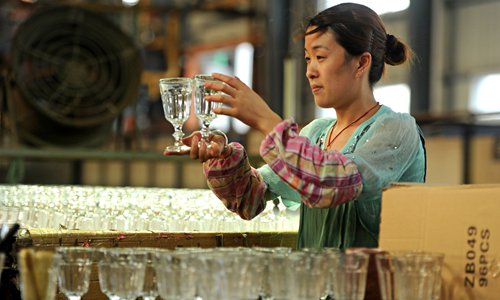Chinese firms to benefit from localizing light industry in South Africa
Investment can support fast-expanding strategic partnership

Workers at a factory in Huainan, East China's Anhui Province, manufacture glasses that will be exported to African countries. Photo: VCG
The popularity of Chinese commodities in South Africa, combined with Chinese enterprises' expertise in light manufacturing and fast-growing bilateral ties, provide broad scope for industrial cooperation, said experts and local businesspeople.
"A wide variety of products from China, including textiles, small commodities, household appliances and building materials, are popular here," Xu Changbin, chairperson of a chain mall called African Trade, a platform for Chinese entrepreneurs in South Africa, told the Global Times.
With the increasing popularity of Chinese products in South Africa, Xu has opened three malls, two in Johannesburg and one in Durban.
A local Chinese entrepreneur surnamed Wang, who sells toys in a China mall based in Johannesburg, told the Global Times that although profits have fallen in the past year due to rising costs and fierce competition, small commodities from China are still competitive among people in South Africa, compared with those from Europe or other Asian countries.
Most of Wang's products are imported from Yiwu, in East China's Zhejiang Province. But he said that "Chinese enterprises could make good profits by making those products here."
"South Africa's light manufacturing industry is underdeveloped, but the people need daily goods such as clothes, toys and blankets. Domestic light manufacturing companies could fill that gap and take advantage of low labor costs here," he said, adding that "we would also benefit from that."
With the two countries celebrating the 20th anniversary of diplomatic relations and moving into a comprehensive strategic relationship, he said, "it's a great opportunity."
Yejoo Kim, a research fellow at the Center for Chinese Studies at Stellenbosch University in South Africa, told the Global Times that the manufacturing sector in South Africa has shrunk in the past decade. Stagnant economic growth and logistics costs, inefficient procedures and a volatile currency - among other factors - have discouraged investors. There have been substantial job losses in such sectors as food processing, beverages, textiles, and furniture.
"From what I know, a number of trade and investment agencies have tried to bring Chinese investors in by providing various incentives," said Kim.
For example, Hisense got support from the South African government's Manufacturing Investment Program when the company expanded its facility.
Kim said that manufacturing can make a great contribution to entrepreneurship, skills transfer and job creation, and there must be a number of areas where China, as a manufacturing powerhouse, can cooperate with South Africa.
Erwin Pon, the investment banking director for East and Southeast Asia at Rand Merchant Bank in South Africa, told the Global Times on Wednesday that Chinese investments have indeed benefited local development. As an example, he mentioned China malls.
"I saw a lot of China malls that have been established in recent years, but what should be noted is that most of them are located in less-developed suburbs of Johannesburg, rather than in the city center.
"These popular malls have revived once-deserted areas, drawing in many stores and restaurants," Pon said. "We call it a 'knock-on effect'."
Nevertheless, Pon also mentioned that when some Chinese light manufacturing companies go to South Africa, they might face some obstacles, such as visa barriers, which the South African government has already vowed to improve.


